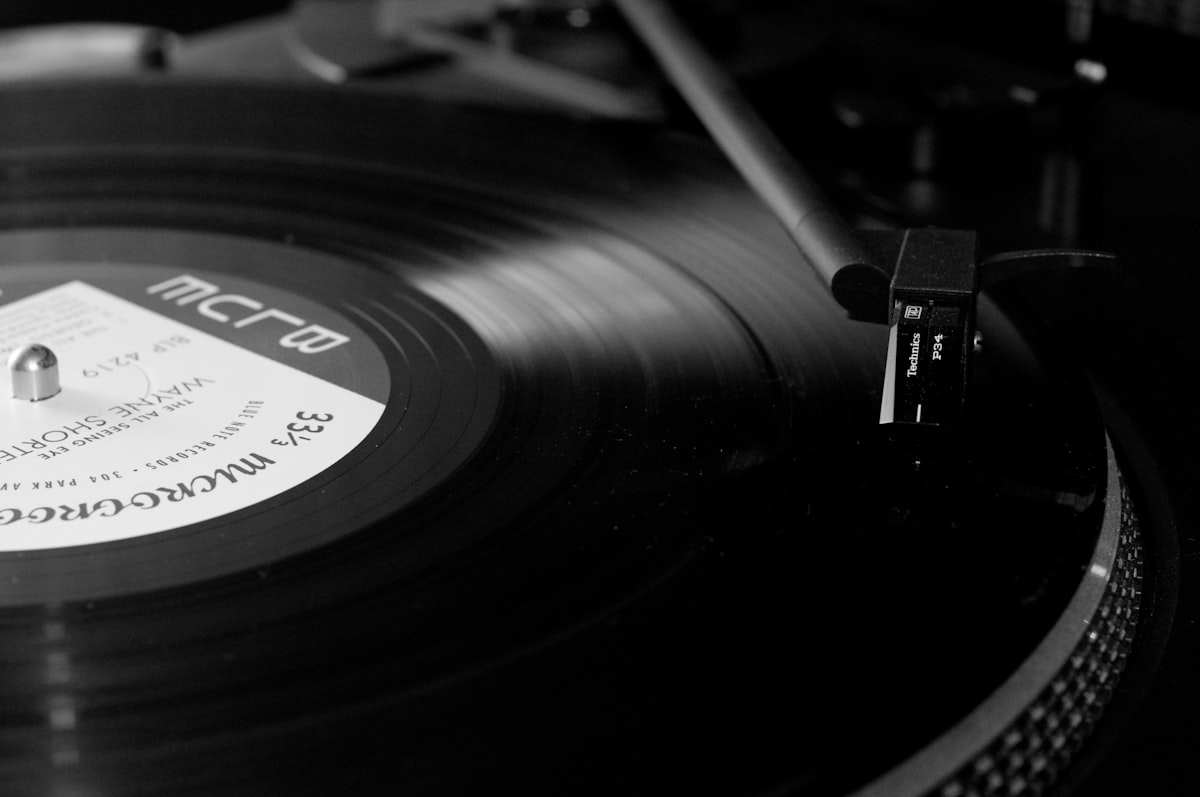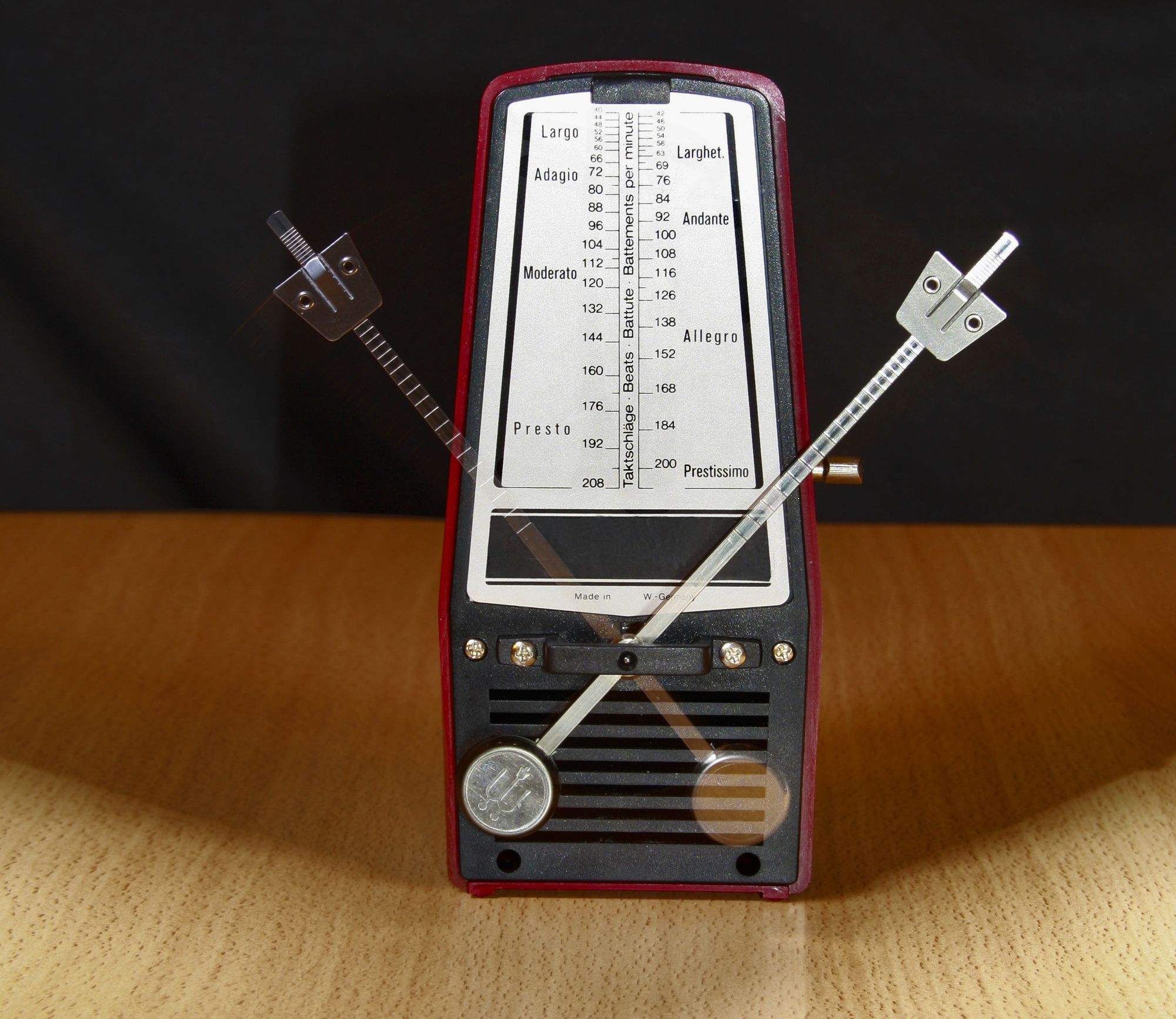Finding the Rhythm in Your Writing
If you’ve seen me on the dance floor or knew me back when I was accidentally cast in several high school musicals, now is your opportunity to quip about my sense of rhythm.

Each morning, I sit in the writing studio in our house and I write. I do this before anyone in the house is up. I’m alone. It’s dark. I don’t have to worry about anyone or anything other than what I’m crafting at the moment.
Some mornings, Natalie wakes up early. She leaves our bedroom, walks past the studio, and goes downstairs to start her day. A few days ago, I needed to take a break, so I walked down there to get myself a cup of coffee and join her for a bit.
“What’s that ticking coming from the studio?” she asked me.
“It’s a metronome,” I said.
She furrowed her brow, took a deep breath, and then returned to her journal or whatever it was that she was doing.
Write to a Metronome
Yes. I write to a metronome. Not a physical one. That would be cool, but I don’t own one and it seems a waste to buy one when there are plenty of free and cheap apps on my laptop and phone that have them built right in.
I set the metronome to 60 beats per minute. Thus, it sounds as much like the ticking of a clock as anything else. It also, more or less, mimics my heart rate which is somewhere between 50 and 60 beats per minute when I’m at rest.
If you come into my studio while I’m writing, you will come into the ticking of a clock, the beating of a heart, the gentle click-clack of a metronome app on my computer or phone.
Why?
Productivity
I don’t watch a lot of football. I used to, but I don’t anymore. I’m just not into it like I used to be. I don’t feel the deep need to wake up on Saturday mornings in the fall and watch several hours of ESPN’s College Gameday and then a dozen more hours of games until a butt-shaped impression has been worn into the cushions of our couch. I used to do that. It’s just not me anymore.
This is beside the point.
When I did watch a lot of football, I was often struck by the way that teams, especially offenses, played with a greater sense of urgency toward the end of the game. Like marathon runners, they’d go through the torture of the first 57 minutes of the game, and then in the last three or four, they’d kick things into a higher gear and sprint to the finish.
If you watch enough football, you’ll see this over and over again. You’ll see that offenses that had been anemic for three quarters are, all of a sudden, able to pass downfield, regroup without a huddle, snap the ball, and do it again. They’ll score a touchdown, the defense will produce a turnover or a three-and-out, and then the offense is back on the field threatening to score again.
If you watch enough football, you’ll see teams put up two or three touchdowns in the final half of the fourth quarter.
While I certainly understand that a football game is a marathon, that the players have to pace themselves in order to have enough fuel left in the tank to finish, I always wondered why they didn’t play with a greater sense of urgency throughout the game.
NOTE: I am not a football coach, nor am I an expert. Moreover, I am not trying to become one. If you want to take issue with what I’m saying from a football perspective: awesome. This is not the point. The point is…
The clock creates a sense of urgency: not just in football, but in other aspects of life too.
I can tell you that, during these last thirty minutes, I have written nearly 1,200 words. I’m not messing around here. The clock is ticking and I’ve got stuff to do. I’ve got only so many minutes to make this writing thing happen before the house begins to stir. The boy will wake up and get out of bed soon and derail my plans. The school day will start. The time is now!
While I do not advocate being hasty in our writing—in fact, I recently wrote about NOT using word count as your primary metric for measuring written productivity—writing to the beat of the metronome does help me to stay focused. It’s not about the word count. It’s about the time. I’m here. I’m with the metronome. I’m keeping time at the keyboard or the typewriter or the journal. I’m making it happen.
If I’m gonna be here and do this thing, I want a sense of urgency. I want to make the most of it!
Rhythm
In addition to helping me stay urgent, productive, and in the present, the metronome also gives me a little bit of rhythm. (Yes, if you’ve seen me on the dance floor at a wedding or if you knew me back when I was accidentally cast in several high school musicals, then you can now insert your joke about me and my sense of rhythm.) There’s a heart beating in this office, beating out at 60 bpm, and the tapping of the keys sometimes falls into line with it.
This is not conscious, mind you. I do not sit here and try to time my keystrokes with the beat of the metronome. Sometimes, however, I notice that my fingertips punching at the keyboard have naturally fallen into 1/8 notes and 1/16 notes and 1/32 notes in a 4/4 rhythm at 60 beats per minute. My fingers carve up the time as the words fall out onto the page. I’m playing jazz here. I’m riffing!
As soon as I notice this, it’s gone. I lose it. So, I try not to notice it, but it does seem to be happening.
I have often wondered, though I’ve never experimented with it, whether or not writing to different beats might produce different rhythms and feelings. For example, if I were writing a fast-paced scene for a piece of fiction—perhaps a scene with a chase in it or maybe a heated argument with a lot of witty repartee—what would happen if I cranked the metronome up to 90 beats per minute? 120?
If I were writing a pastoral description of the Texas Hill Country, trying to evoke the way that the hills seem to roll out from one another in an even, sinusoidal progression, one after the other, then perhaps I might slow things down and move at 45 bpm.
What if?
I don’t know. I’ve been a little scared to try because I’m worried that I might make overt, conscious attempts to move at the speed of the metronome. (Please insert another joke about Hebert’s sense of rhythm: __________. Good one! That was pretty funny.)
I haven’t tried, but maybe I should…
Doing the Unconscious;
Doing What Works
To attempt to write to the rhythm would be against the point. The point is to put myself into a state of flow, to get outside of the conscious mind, and to simply go. The urgency that the metronome creates, perhaps with the accidental combination of its rhythm, helps me to get out of the conscious awareness of my surroundings—chair, desk, light, bird sounds outside the window, the hum of the fan from the bathroom because Gus can never seem to turn it off when he leaves—and into the world I’m creating on the page.
Your mileage with the metronome will vary. You can try it out, but you should always simply do what works.
If writing to a metronome helps you move your mind outside of your writing space and into the world of your text, then do it. Get into that unconscious mode where the words tumble out of you.
If it doesn’t, then put the damn thing back on the piano and get back to the business of writing.
Do what works.
